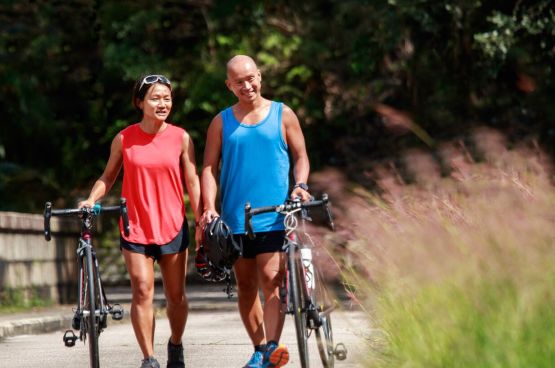Five ways to stay fit and healthy
It can be hard to know where to start when trying to improve your health. There’s so much information and advice out there - it can be overwhelming. So, it’s good to start with the basics and keep things simple. Here, I share five easy ways to stay fit and healthy.

Make movement enjoyable
We all know how important exercise is. But there’s little point forcing yourself to the gym if you find it a chore. The key to consistent exercise is to find something you enjoy. Aim for at least 150 minutes of movement per week. This can be split over several days. You would ideally do a mixture of cardiovascular exercise such as:
- cycling
- playing football
- tennis
And strength training exercise, including:
- weightlifting
- yoga
- climbing
Many exercises, such as kettlebells and high intensity interval training can combine elements of both cardio and strength work.
Remember, movement also includes things such as surfing, dog walking, and digging in the garden so these activities all count towards your exercise goals. If you struggle to fit in longer sessions, why not consider some movement snacking? These are short sessions of star jumps, stair climbing, or press ups which can add up over the day.
It’s important not to over train though, so do remember to take rest days where you just take a gentle stroll, do some stretches or mobility work.
Stress less
Reducing your stress levels can make a huge difference to your health and wellbeing. Sometimes we don’t notice how much stress is affecting us until we become unwell. Signs of stress can include:
- tense muscles
- a racing heart
- a restless mind
If you experience these symptoms, it might be time to take action. Remember that long term stress can affect your immune system, and put extra strain on your cardiovascular system. So, it’s a good idea to take steps to manage stress now to protect your health later on.
Everybody reacts differently to stress, and different things relax different people. But there’s good evidence to show that mind-body techniques such as yoga and meditation can lower your levels of the stress hormone cortisol.
These techniques work by switching on the ‘rest and digest’ state in your body – otherwise known as the parasympathetic nervous system.
Here, your heart and breathing rates reduce, and your muscles relax. This puts you into a more restful state. Even a few minutes of meditation each day can make a difference, as can pausing to breathe deeply.
Other strategies to reduce stress include:
- avoiding stressful news first thing in the morning and before bed
- reading – which can trigger the relaxation response
- cutting back on caffeine if you are sensitive to it
- regularly socialising – this can reduce stress and anxiety
Prioritise sleep
A lack of quality sleep can make you more vulnerable to stress and less likely to exercise. It can also make you more likely to reach for high calorie processed foods. Also, when you sleep poorly, the extra stress you feel can make it harder to sleep the next day.
Occasional sleepless nights are normal and nothing to worry about. But if you’re sleeping poorly regularly it’s a good idea to address these issues straight away. Below are some tips to help you sleep better:
- get up at the same time every morning as this helps to regulate your body clock
- avoid strong exercise, caffeine, alcohol, and eating close to bedtime
- reduce screen time 90 mins before bed and read under low light instead
- practise deep breathing or write down any worries before you try to go to sleep
Eat for energy
Eating well will fuel your body during the day. It’s good to avoid blood sugar highs and lows. This is because it can leave you feeling fatigued and can even trigger anxiety. Instead aim for a steady supply of energy.
You can do this by including plenty of wholegrains which release energy slower than refined, white flour products. By including a source of protein with your carbohydrates (such as nuts, eggs, or Greek yoghurt) you can stay fuller for longer too.
As well as supporting your immune system in the short term, eating a wide range of brightly coloured fruit and vegetables can also help you to prevent chronic diseases in the future. Vitamins, minerals, and antioxidants within these foods can help to reduce your risk of heart disease, certain cancers, and cognitive decline.
And remember to stock up on fibre. This is because fibre can help you with good digestion. Also prebiotics within foods such as oats, onions and green bananas also feed the good gut bacteria in your intestines. This can reduce your risk of bowel issues and can even lower your risk of depression and anxiety.
Stay social
When thinking about your health it can be easy to forget just how important social contact is. Studies have shown that loneliness can have similarly harmful effects to smoking.
It’s easy to get caught up with day-to-day life and responsibilities. But prioritising time with friends can support your immune system, reduce your blood pressure, and reduce your future risk of cognitive decline. So, scheduling in social events as you would other important appointments could help you to stay connected and boost your health too.
Are you interested in learning more about your health? Discover more about our range of health assessments.
-
Sources Sources
- Physical activity guidelines. UK government. Gov.uk, accessed 19 July 2023
- Personal correspondence with Jed Campbell Williams, Health adviser, July 2023
- What is stress? MIND. Mind.org.uk, published March 2022
- Seiler A, Fagundes C et Christian L. The impact of everyday stressors on the immune system and health. Choukèr, A. (eds) Stress Challenges and Immunity in Space. Springer, Cham
- Franklin BA, Rusia A, Haskin-Popp C, Tawney A. Chronic Stress, Exercise and Cardiovascular Disease: Placing the Benefits and Risks of Physical Activity into Perspective. Int J Environ Res Public Health. 2021 Sep 21;18(18):9922. doi: 10.3390/ijerph18189922. PMID: 34574843; PMCID: PMC8471640. www.ncbi.nlm.nih.gov/pmc/articles/PMC8471640/
- Adam Koncz, Zsolt Demetrovics & Zsofia K. Takacs (2021) Meditation interventions efficiently reduce cortisol levels of at-risk samples: a meta-analysis, Health Psychology Review, 15:1, 56-84, DOI: 10.1080/17437199.2020.1760727. www.tandfonline.com/doi/full/10.1080/17437199.2020.1760727
- Klevebrant L, Frick A. Effects of caffeine on anxiety and panic attacks in patients with panic disorder: A systematic review and meta-analysis. Gen Hosp Psychiatry. 2022 Jan-Feb;74:22-31. doi: 10.1016/j.genhosppsych.2021.11.005. Epub 2021 Dec 2. PMID: 34871964. pubmed.ncbi.nlm.nih.gov/34871964/
- McLean, L., Gaul, D. & Penco, R. Perceived Social Support and Stress: a Study of 1st Year Students in Ireland. Int J Ment Health Addiction (2022).
- Laurent Brondel and others, Acute partial sleep deprivation increases food intake in healthy men, The American Journal of Clinical Nutrition. 2010; 91: 6. https://doi.org/10.3945/ajcn.2009.28523. academic.oup.com/ajcn/article/91/6/1550/4597153
- Sleep and mental health. MIND. Mind.org.uk, accessed 19 July 2023
- Low blood sugar. NHS. www.nhs.uk, accessed 19 July 2023
- Wholegrains. British association of dietitians. Bda.uk.com, accessed 19 July 2023
- Protein. British nutrition foundation. Nutrition.org.uk, accessed 19 July 2023
- 5 a day. British heart foundation. Bhf.org.uk, accessed 19 July 2023
- Kidambi N, Lee EE. Insight into Potential Mechanisms Linking Loneliness and Cognitive Decline: Commentary on "Health Factors as Potential Mediator the Longitudinal Effect of Loneliness on General Cognitive Ability". Am J Geriatr Psychiatry. 2020 Dec;28(12):1284-1286. doi: 10.1016/j.jagp.2020.08.015. Epub 2020 Aug 28. PMID: 32950365; PMCID: PMC7452903.www.ncbi.nlm.nih.gov/pmc/articles/PMC7452903/
- Leschak CJ, Eisenberger NI. Two Distinct Immune Pathways Linking Social Relationships With Health: Inflammatory and Antiviral Processes. Psychosom Med. 2019 Oct;81(8):711-719. doi: 10.1097/PSY.0000000000000685. PMID: 31600173; PMCID: PMC7025456
- Harding BN, Hawley CN, Kalinowski J, et al. Relationship between social support and incident hypertension in the Jackson Heart Study: a cohort study BMJ Open 2022;12:e054812. doi: 10.1136/bmjopen-2021-054812
- Social isolation and dementia risk. Alzheimer’s UK. alzheimersresearchuk.org, accessed 19 July 2023
About our health information
At Bupa we produce a wealth of free health information for you and your family. This is because we believe that trustworthy information is essential in helping you make better decisions about your health and wellbeing.
Our information has been awarded the PIF TICK for trustworthy health information. It also follows the principles of the The Information Standard.

More exercise and fitness articles
Did you find our advice helpful?
We’d love to hear what you think. Our short survey takes just a few minutes to complete and helps us to keep improving our healthy lifestyle articles.
Legal disclaimer
This information was published by Bupa's Health Content Team and is based on reputable sources of medical evidence. It has been reviewed by appropriate medical or clinical professionals and deemed accurate on the date of review. Photos are only for illustrative purposes and do not reflect every presentation of a condition.
Any information about a treatment or procedure is generic, and does not necessarily describe that treatment or procedure as delivered by Bupa or its associated providers.
The information contained on this page and in any third party websites referred to on this page is not intended nor implied to be a substitute for professional medical advice nor is it intended to be for medical diagnosis or treatment. Third party websites are not owned or controlled by Bupa and any individual may be able to access and post messages on them. Bupa is not responsible for the content or availability of these third party websites. We do not accept advertising on this page.







